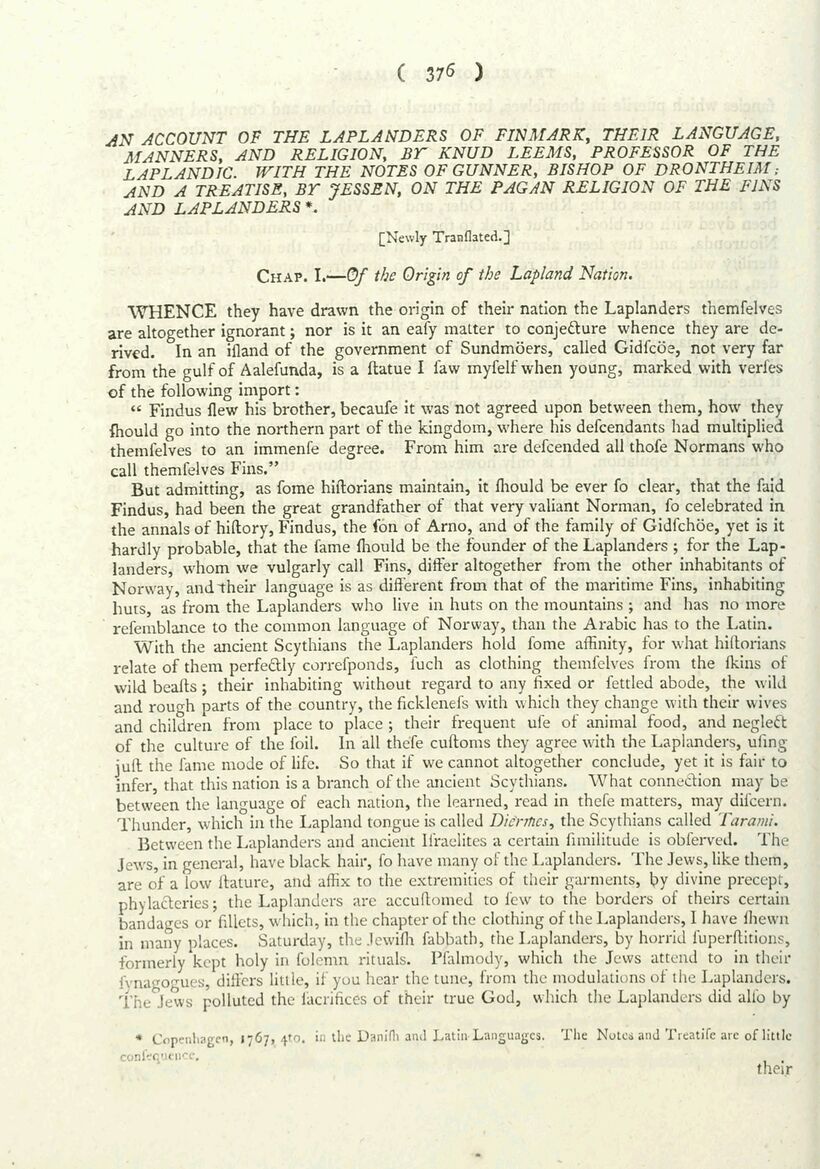
Full resolution (JPEG) - On this page / på denna sida - Pages ...

<< prev. page << föreg. sida << >> nästa sida >> next page >>
Below is the raw OCR text
from the above scanned image.
Do you see an error? Proofread the page now!
Här nedan syns maskintolkade texten från faksimilbilden ovan.
Ser du något fel? Korrekturläs sidan nu!
This page has never been proofread. / Denna sida har aldrig korrekturlästs.
( 376 )
AN ACCOUNT OF THE LAPLANDERS OF FINMARK, THEIR LANGUAGE,
MANNERS, AND RELIGION, BY KNUD LEEMS, PROFESSOR OF THE
LAPLANDIC. WITH THE NOTES OF GUNNER, BISHOP OF DRONTHEIM ;
AND A TREATISE, BY JESSEN, ON THE PAGAN RELIGION OF THE FINS
AND LAPLANDERS*.
[Newly Tranflated.]
Cuap. 1—Of the Origin of the Lapland Nation.
WHENCE they have drawn the origin of their nation the Laplanders themfelves
are altogether ignorant ; nor is it an ealy matter to conjecture whence they are de-
rived. Inan ifland of the government of SundmGers, called Gidfcée, not very far
from the gulf of Aalefunda, is a ftatue I faw myfelf when young, marked with verfes
of the following import :
“«< Findus flew his brother, becaufe it was not agreed upon between them, how they
fhould go into the northern part of the kingdom, where his defcendants had multiplied
themfelves to an immenfe degree. From him are defcended all thofe Normans who
call themfelves Fins,”’
But admitting, as fome hiftorians maintain, it fhould be ever fo clear, that the faid
Findus, had been the great grandfather of that very valiant Norman, fo celebrated in
the annals of hiftory, Findus, the fon of Arno, and of the family of Gidfchée, yet is it
hardly probable, that the fame fhould be the founder of the Laplanders ; for the Lap-
landers, whom we vulgarly call Fins, differ altogether from the other inhabitants of
Norway, and their language is as different from that of the maritime Fins, inhabiting
huts, as from the Laplanders who live in huts on the mountains ; and has no more
refemblance to the common language of Norway, than the Arabic has to the Latin.
With the ancient Scythians the Laplanders hold fome afkinity, for what hiftorians
relate of them perfeétly correfponds, fuch as clothing themfelves from the fkins of
wild beafts; their inhabiting without regard to any fixed or fettled abode, the wild
and rough parts of the country, the ficklenefs with which they change with their wives
and children from place to place; their frequent ufe of animal food, and neglect
of the culture of the foil. In all thefe cuftoms they agree with the Laplanders, ufing
juft the fame mode of life. So that if we cannot altogether conclude, yet it is fair to
infer, that this nation isa branch of the ancient Scythians. What connection may be
between the language of each nation, the learned, read in thefe matters, may difcern.
Thunder, which in the Lapland tongue is called Diermes, the Scythians called Tarami.
Between the Laplanders and ancient Ifraelites a certain fimilitude is obferved. The
Jews, in general, have black hair, fo have many of the Laplanders. ‘The Jews, like them,
are of a low ftature, and aflix to the extremities of their garments, by divine precept,
phylacteries ; the Laplanders are accuftomed to few to the borders of theirs certain
bandages or fillets, which, in the chapter of the clothing of the Laplanders, I have {hewn
in many places. Saturday, the Jewifh fabbath, the Laplanders, by horrid fuperftitions,
formerly kept holy in folemn rituals. Pfalmody, which the Jews attend to in their
fynagogues, differs little, if you hear the tune, from the modulations of the Laplanders.
‘The Jews polluted the facrifices of their true God, which the Laplanders did allo by
* Copenhagen, 1767, 4to, in the Danifh and Latin Languages. The Notes and Treatife are of little
; P g j 4 Beas ttle
coniequence,
their
<< prev. page << föreg. sida << >> nästa sida >> next page >>